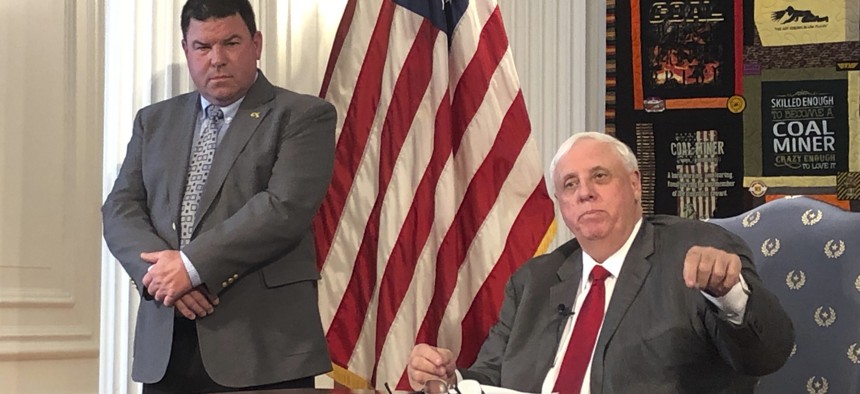Federal Aid Critical for Closing West Virginia Budget Gap, Republican Governor Says

West Virginia Gov. Jim Justice, right, and West Virginia Secondary School Activities Commission Executive Director Bernie Dolan address a news conference Thursday, March 12, 2020, at the state Capitol in Charleston, W.Va. AP Photo/John Raby
State revenues are lagging by about $200 million. Without enough federal funds to help bridge that shortfall, Gov. Jim Justice warns “you're going to have a bankrupt state.”
West Virginia’s Republican governor on Friday stressed that it is crucial for the state to be able to use federal aid funding to backfill tax revenue losses that are occurring amid the drastic economic slowdown that the coronavirus pandemic has caused.
Gov. Jim Justice said the state’s roughly $3.69 billion in general revenue collections to date in the current fiscal year were trailing expectations by about $200 million. "We have our revenue numbers. They're terrible. We expected them to be terrible,” Justice said.
“I really believe wholeheartedly that we're going to address the number through the federal government allowing us to backfill revenue,” the governor added during a news conference. "We do not have that assurance yet. But we're working it.”
Justice went on to warn that if enough federal aid isn’t directed toward offsetting the state’s lagging revenues, “you're going to have a bankrupt state.”
The governor’s comments come as a chorus of state and local leaders are pushing Congress and the White House to provide both more federal aid funding to help states get through the current crisis, and to also loosen restrictions on how the money can be used.
A coronavirus relief package, known as the CARES Act, that President Trump signed in late March created a $139 billion relief fund for states and larger localities.
But federal guidelines for the fund put out by the Trump administration require the money to be used for expenses with clear links to the virus response, which means the fund can’t be tapped to make up for general revenue losses due to the poor economy.
Some Republicans and the president have taken to framing the debate over providing further federal relief for states and local governments in increasingly partisan terms, suggesting it’s primarily Democratic-leaning states that are seeking out major assistance.
“What’s happening is the Democrats have come to us and they’d like to do a phase four and we’ll think about what’s happening,” Trump said on Thursday, referring to the next phase of anticipated federal coronavirus relief legislation.
“They want to help the states ... and bailouts are very tough and they happen to be Democrat states. It’s California, it’s New York, it’s Illinois. You start with those three and the Republican states are in strong shape. You know, I don’t know. Is that luck or is that talent or is it just a different mentality? But the Republican-run states are in strong shape.”
Republicans control both chambers of the state Legislature in West Virginia and a little over two-thirds of voters in the state backed Trump in the last presidential election.
The state was allocated $1.25 billion of the money from the CARES Act relief fund. Democrats in the state Senate on Friday urged Justice to commit at least $500 million of that funding to provide assistance to small businesses.
But Justice emphasized the importance, in his view, of preserving federal aid money so it can possibly be used to help deal with the state’s revenue gap, rather than channeling large portions of it to businesses or local governments.
"If you have the ability to be able to backfill the revenue, you know, and you don't backfill the revenue, and you end up with a bankrupt state, then the small businesses are going to die and the cities and the counties are going to die,” he said.
The governor said that he’d been in regular contact with the White House and congressional lawmakers and expressed confidence that the federal government would come through in allowing relief funding to go toward addressing revenue shortfalls like the one in his state.
“I’ve surely, surely got some inside baseball information,” he added. “I don't know, but I feel like that we're going to be okay from the standpoint of being able to backfill.”
Looking further ahead, Justice said that in a pessimistic scenario where the state’s economy remains largely hobbled through September and the first quarter of its next fiscal year, which begins July 1, West Virginia could be looking at a revenue shortfall as deep as $700 million. "We don't think that's going to happen,” he said.
For now, there are no concerns the state will not be able to pay its bills in the next month, or even into early June, Justice said. He also said some of West Virginia’s current revenue gap is because the state, like others, delayed its deadline for filing income taxes from April to July.
“But there's still a tremendous amount of shortfall dollars because, you know, the fact that West Virginia is just basically shut down,” he said.
Bill Lucia is a Senior Reporter for Route Fifty and is based in Olympia, Washington.
NEXT STORY: Saving Main Street: Why State and Local Governments Are Vital for Its Survival






